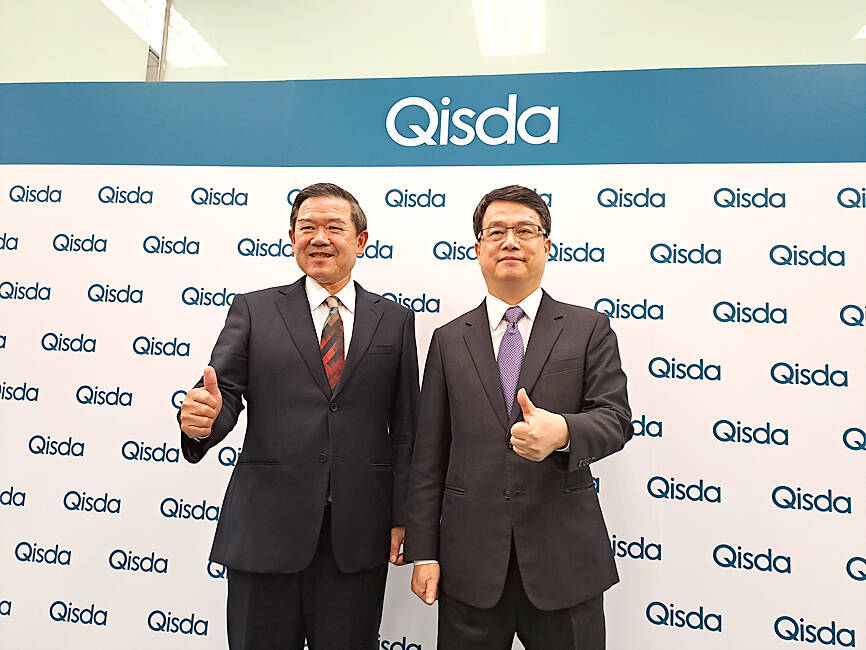Electronics manufacturer Qisda Corp (佳世達) yesterday said that its board of directors had approved the distribution of a cash dividend of NT$2 per common share, representing a payout ratio of 47.62 percent based on its earnings per share of NT$4.2 last year.
The company said it made a net profit of NT$8.25 billion (US$269.8 million) last year, down 0.7 percent from a year earlier.
Last year’s net profit was the company’s second-best performance in the past 10 years and came second only to the previous year’s NT$8.31 billion, or earnings per share of NT$4.22.

Photo: CNA
Qisda makes computer peripherals, communications devices and consumer electronics. The firm also provides consulting and technical services, and has been developing its value-added businesses.
Last year’s financial performance showed that the firm weathered a downturn in the electronics industry, as growth in high-value-added products helped offset declines in information technology products due to inventory corrections, Qisda said in a statement.
Information technology products, monitors and projectors were the biggest sources of revenue last year, making up 61 percent of the company’s revenue during the first three quarters of last year, company data showed.
Gross margin was flat at 14.4 percent last year from a year earlier, the statement said.
High-value-added and higher-margin products — such as medical devices, smart solutions and networking products — contributed about NT$100 billion in revenue last year, Qisda said.
Revenue last year expanded 6.1 percent to NT$239.83 billion from NT$225.96 billion the previous year, an all-time high, it said.
The cash dividend represents a yield of 6.55 percent based on the company’s closing share price of NT$30.55 yesterday.
Shareholders are to vote on the proposal at the company’s annual general meeting on May 29.
The company’s board yesterday also approved a plan to inject US$235 million into its hospital investments, which would help enhance channel deployment for its medical businesses.
Qisda is to release detailed financial figures and give its business outlook during an online investor conference tomorrow.

To many, Tatu City on the outskirts of Nairobi looks like a success. The first city entirely built by a private company to be operational in east Africa, with about 25,000 people living and working there, it accounts for about two-thirds of all foreign investment in Kenya. Its low-tax status has attracted more than 100 businesses including Heineken, coffee brand Dormans, and the biggest call-center and cold-chain transport firms in the region. However, to some local politicians, Tatu City has looked more like a target for extortion. A parade of governors have demanded land worth millions of dollars in exchange

Hong Kong authorities ramped up sales of the local dollar as the greenback’s slide threatened the foreign-exchange peg. The Hong Kong Monetary Authority (HKMA) sold a record HK$60.5 billion (US$7.8 billion) of the city’s currency, according to an alert sent on its Bloomberg page yesterday in Asia, after it tested the upper end of its trading band. That added to the HK$56.1 billion of sales versus the greenback since Friday. The rapid intervention signals efforts from the city’s authorities to limit the local currency’s moves within its HK$7.75 to HK$7.85 per US dollar trading band. Heavy sales of the local dollar by

Taiwan Semiconductor Manufacturing Co’s (TSMC, 台積電) revenue jumped 48 percent last month, underscoring how electronics firms scrambled to acquire essential components before global tariffs took effect. The main chipmaker for Apple Inc and Nvidia Corp reported monthly sales of NT$349.6 billion (US$11.6 billion). That compares with the average analysts’ estimate for a 38 percent rise in second-quarter revenue. US President Donald Trump’s trade war is prompting economists to retool GDP forecasts worldwide, casting doubt over the outlook for everything from iPhone demand to computing and datacenter construction. However, TSMC — a barometer for global tech spending given its central role in the

An Indonesian animated movie is smashing regional box office records and could be set for wider success as it prepares to open beyond the Southeast Asian archipelago’s silver screens. Jumbo — a film based on the adventures of main character, Don, a large orphaned Indonesian boy facing bullying at school — last month became the highest-grossing Southeast Asian animated film, raking in more than US$8 million. Released at the end of March to coincide with the Eid holidays after the Islamic fasting month of Ramadan, the movie has hit 8 million ticket sales, the third-highest in Indonesian cinema history, Film